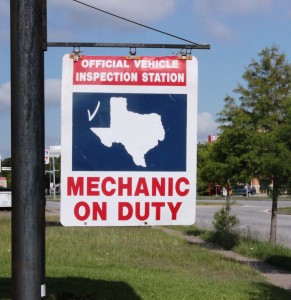Vehicle Inspection Fraud Task Forces Running on Empty

Dave Fehling / StateImpact
In the war on air pollution in Texas’s smoggiest cities, investigators say the state has slashed their funding even as they continue to find illegal vehicle inspection operations thriving in their communities.
“Hundreds of thousands of vehicles have fraudulent inspection stickers on them right now,” said Lt. Eddie Hazel who heads an emissions fraud task force run out of the Harris County Precinct 4 Constable’s office. And he’s talking about just in the Houston area.
Anti-pollution Programs Cut
To help reduce air pollution in metro areas including Houston, Dallas, Austin and El Paso, vehicles in 17 counties have to be checked to make sure pollution control equipment is working. If they fail, they can’t get a state inspection sticker until they’re fixed.
But some state-certified repair shops illegally pass cars that should have failed in exchange for a charge that can be more than double the maximum $39.75 fee mandated by the state (learn more in our RADIO STORY).
To fight fraud, the state uses a portion of the inspection fees to fund enforcement. The state also set-up a fund to help low-income vehicle owners pay for the repairs or get a new vehicle thereby reducing the incentive to get an inspection sticker illegally. Advocates for clean air like the Sierra Club said the programs have been very effective.
“We got a lot of bang for our buck. We took thousands of (out of compliance) vehicles off the roads in the Houston area and the Dallas area and the Austin area,” testified Cyrus Reed. He’s with the Sierra Club’s Lone Star Chapter and spoke at a hearing April 16th held by the House Committee on Environmental Regulation.
What concerned Reed—as well as officers from county emissions task forces who also testified—was that since 2011, funding for enforcement and for the low-income assistance has been dramatically reduced. For example, in 2009 in the Houston-Galveston region, $17.8 million was spent repairing or replacing almost 8,000 vehicles. Last year, those numbers plummeted to $4.5 million for just 3,800 vehicles.

Dave Fehling / StateImpact
Lt. Eddie Hazel with the Harris County Clean Air Task Force
There were similar reductions made to enforcement funding.
“They’ve cut the funding for us the last biennium and this biennium. They cut it 88 percent,” Lt. Hazel told StateImpact.
“We’re OK for the next two years, we’ll probably have enough to get back to the legislature in 2015 and try to get our funding back. Of course, if we don’t get it back we’ll be out of business,” Hazel said.
Millions of Dollars ‘Just Sitting There’
What’s frustrating to him and others who support the programs is that the state has the money—millions of dollars—-that was supposed to be dedicated to the emissions programs.The funds come by taking a small portion—from $2 to $6 per vehicle—from the inspection fee.
“But over the last session and this session, the legislature has failed to allocate that money back to the programs. It’s just sitting there. It generates about $40 million a year. But this year they only allocated between $7 and $8 million,” explains the Sierra Club’s Reed. The reason is the state’s spending cap; even if funds are collected for a specific purpose, spending them might have to be restricted to meet the cap.
Freeing up funds for emissions programs could become more critical as federal clean air rules are toughened. More counties may be ruled “non-attainment” and have to start testing vehicles.
The legislature this year considered proposals to restore funding to the emissions programs and while one measure passed, it didn’t actually increase current funding but rather “increased the amount that could be appropriated to prepare for additional counties becoming non-attainment counties” according to an email from the office of Rep. Patricia Harless who sponsored HB 2859.
Michael Nowels with the Texas State Inspection Association, a trade group for inspection station operators, said they support restoring state funding for enforcement to root out what Nowels says are a relatively few bad players.
“Ninety-seven, 98 percent of these people are out there doing the job and doing it right. There’s a small percentage out there who are doing things that are bad for the state. But targeting those individuals and getting to those individuals is a very difficult task,” Nowels told StateImpact.